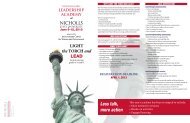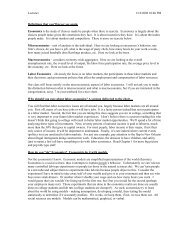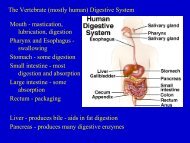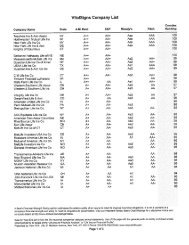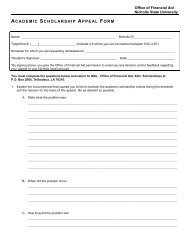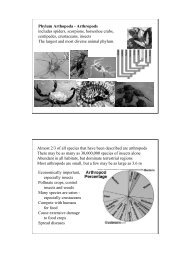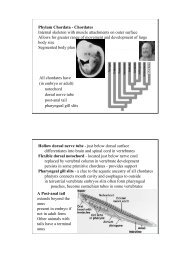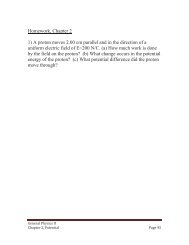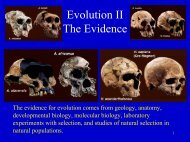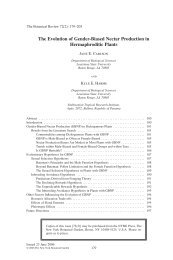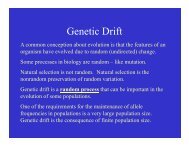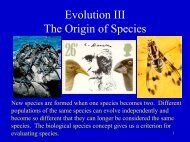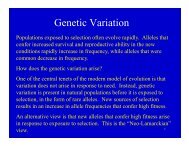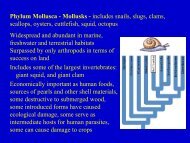Voila 2007 Fall (PDF) - Nicholls State University
Voila 2007 Fall (PDF) - Nicholls State University
Voila 2007 Fall (PDF) - Nicholls State University
You also want an ePaper? Increase the reach of your titles
YUMPU automatically turns print PDFs into web optimized ePapers that Google loves.
By Brandon Rizzuto<br />
With the sun bearing down on his rapidly dehydrating<br />
team and spectators on the brink of uncomfortable sunburns,<br />
head tennis coach Jim Hunter seems impervious to the weather.<br />
As he exits one of the courts and shuts the gate, a smile cracks<br />
his face as he casually jokes with one of the Colonel faithful in<br />
the bleachers and then checks on one of his players. Hunter<br />
then spouts his signature phrase: “Life is just too serious to take<br />
it seriously.”<br />
His simple, to-the-point motto barely<br />
hints at the complex man with the history that’s<br />
anything but simple.<br />
On the surface, he’s a legendary tennis<br />
coach and player. His 370-plus wins as a collegiate<br />
head coach and his singles and doubles<br />
wins as a player at the 1966 Panama Armed<br />
Forces championship are just the public part of<br />
Hunter’s life, a mere chapter in the fascinating<br />
book that is his life.<br />
The journey began for James Neal “Bull”<br />
Stevens in a farmhouse in Wilburton, Okla.<br />
“I was born January 4, 1940, I think. There<br />
is no actual birth certificate for me to know<br />
exactly,” Hunter says. “My family was very<br />
poor. They were grape pickers and berry pickers<br />
before settling in Oklahoma.”<br />
His birth mother, Emma Stevens, died in<br />
childbirth when Hunter was only a year old,<br />
and his father, Huey Stevens, could not support<br />
the entire family on his dollar-a-day salary<br />
building Jesse James <strong>State</strong> Park.<br />
Hunter’s older brothers and sisters began taking the<br />
younger siblings into their homes, but as each one took in a<br />
few, Hunter was at the short end of the stick.<br />
“I was kind of the odd guy out, so my father put me up for<br />
adoption,” Hunter says. “Then I was adopted in Dallas by two<br />
of the kindest people ever. My foster father was the nicest man<br />
to ever live, and my foster mother was tough on me.”<br />
Once adopted by Dora “Babe” and Will “Archie” Hunter<br />
in 1945, he returned to Wilburton only after the death of his<br />
brother in 1952. While there, he met with his father for the first<br />
time since his adoption.<br />
“That was the only time that I remember my father with<br />
me. I was alone on the back porch of our old farmhouse where I<br />
Hunter at Fort Dix in New Jersey<br />
(1960s)<br />
had been born. He said to me, ‘Ah, Bull, I had so many dreams<br />
that didn’t come true,’” Hunter says. “I was only in seventh<br />
or eighth grade at the time, and I didn’t understand what he<br />
meant until I matured. He was trying to tell me that people<br />
have dreams that don’t come true and what do you do with a<br />
one-year-old child when all your family and life is destroyed. So<br />
when I was in college, I came to understand why he did what<br />
he did.”<br />
That was the last time he saw or spoke with Huey.<br />
Babe and Archie wanted the best for their<br />
son, so they sent Hunter to an ROTC school<br />
in Dallas. Hunter obliged them even though he<br />
had other plans.<br />
“In the ninth grade I wanted to go to the<br />
local high school to play sports. They thought<br />
this was foolish, given their upbringing during<br />
the Depression,” he says. “I did very well in<br />
ROTC; in fact, I was the No. 1-ranked cadet.<br />
After high school, I worked my way through<br />
college, took ROTC and upon graduation was<br />
commissioned a second lieutenant in the U.S.<br />
Army.”<br />
He completed his undergraduate degree in<br />
history and political science at the <strong>University</strong> of<br />
Texas at Arlington in 1961 and went on to serve<br />
28 years in the Army.<br />
By the time he was 28 and in his 14th year<br />
of service, Hunter was ordered to Vietnam.<br />
“Those were the defining years of my life.<br />
I was never in my 20s because I was always<br />
preparing, getting ready, going to and recovering<br />
from Vietnam,” he says. “I remember when my tour was over<br />
and I got back to Seattle. I bought four or five pieces of cherry<br />
pie because they had real cherries in them. And I bought some<br />
milk because it was real. I remember taking a shower when I<br />
got back, and letting the water run in my mouth because in<br />
Vietnam you couldn’t drink the water. I was just so happy.”<br />
After a day in Seattle and a few discomforting encounters<br />
with anti-war activists, Hunter, with a Bronze Star in hand,<br />
headed back to Dallas to see his foster parents.<br />
He stayed with the Army, playing tennis and winning<br />
tournaments. In 1977, Hunter was nationally ranked by the<br />
U.S. Tennis Association, reaching No. 16 in doubles and No.<br />
41 in singles.<br />
Duty Calls … Again<br />
Jim Hunter has answered the call<br />
to Vietnam and now to <strong>Nicholls</strong> tennis.<br />
38 | Voilà! 39 | Voilà!



